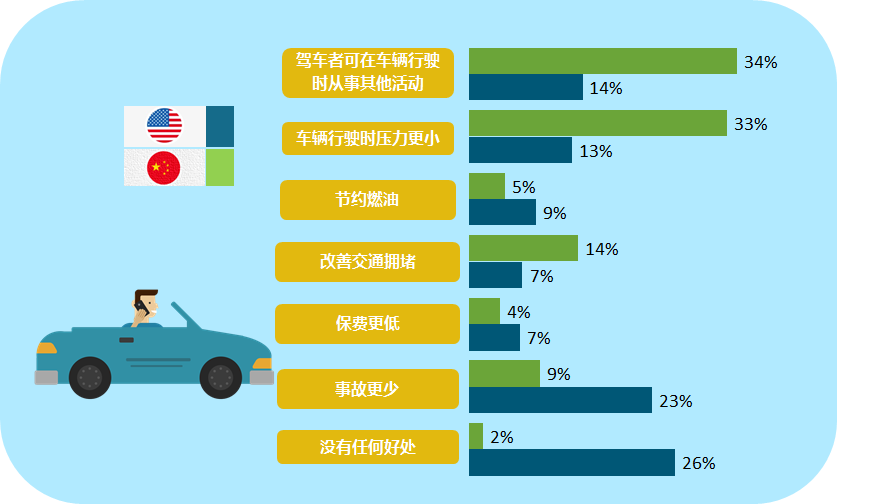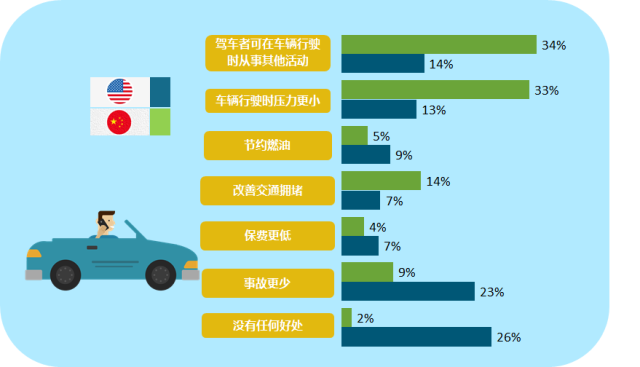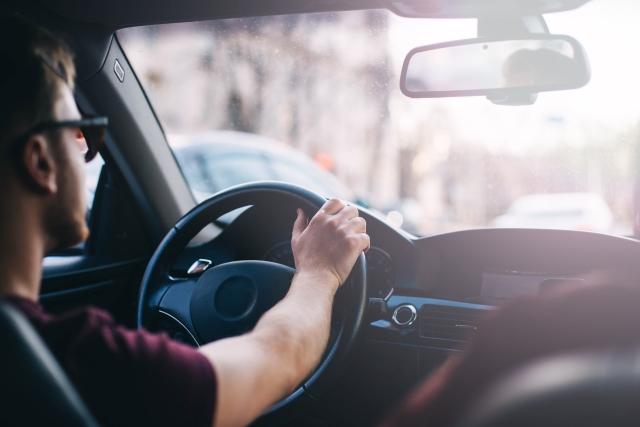JD Power Observation: Chinese Consumers' Autonomous Driving Tendency Survey
The world's leading market research company JD Power (Jun Di) has recently released the "Chinese Consumers' Autonomous Driving Tendency Survey". The survey found that Chinese consumers have a high degree of trust in autonomous driving technology, as well as the safety of autonomous driving 2. There are concerns about the lack of corresponding laws and regulations.
Research shows that 10% and 68% of Chinese consumers respectively say they will "fully trust" and "may trust" fully automated driving technology, and this higher level of trust is evenly distributed among consumers of all ages. Only 4% of consumers "completely distrust" fully automated driving technology.

78% of Chinese consumers said that they will "fully trust" and "may trust" fully automated driving technology
In addition, consumers' trust in autonomous driving is directly proportional to driving frequency. 84% of the respondents who drove every week said that they would “fully believe” and “may believe” fully automated driving technology, and this percentage fell to 65% among those who did not drive.
Jacob George, Vice President and Managing Director of JD Power Asia Pacific, said: "Compared to American consumers, Chinese consumers have shown great expectations and trust in autonomous driving technology. A similar study by JD Power in the United States shows that 35% Of Americans do n’t believe in fully autonomous driving technology, and more than a quarter of Americans believe that autonomous driving technology has no benefits. "
78% of Chinese consumers said that they will "fully trust" and "may trust" fully automated driving technology
In addition, consumers' trust in autonomous driving is directly proportional to driving frequency. 84% of the respondents who drove every week said that they would “fully believe” and “may believe” fully automated driving technology, and this percentage fell to 65% among those who did not drive.
Jacob George, Vice President and Managing Director of JD Power Asia Pacific, said: "Compared to American consumers, Chinese consumers have shown great expectations and trust in autonomous driving technology. A similar study by JD Power in the United States shows that 35% Of Americans do n’t believe in fully autonomous driving technology, and more than a quarter of Americans believe that autonomous driving technology has no benefits. "

2% of Chinese consumers and 26% of American consumers believe that autonomous driving technology does not benefit
Although Chinese consumers have a high degree of trust in autonomous driving technology, there is no lack of worries. The biggest worries are concerns about technical failures. 53% of Chinese consumers are worried about "possible technical failure / system error", followed by "legal liability at the time of the accident" (18%) and "vehicle may be hacked" (11%).
The biggest concern of Chinese consumers about autonomous driving technology lies in possible technical failures and system errors
"Like the United States and other mature markets, the success of autonomous driving technology in China also needs to overcome a series of obstacles, such as infrastructure improvements, the promulgation of laws and regulations, and the protection of data privacy. The response to this series of challenges is still very long. Way, but we are very optimistic about the prospects of autonomous driving in China. As one interviewee said, 'I am looking forward to the day when autonomous driving becomes popular, I can enjoy the new driving experience brought by technology'. "Jacob George thinks.
A total of 1,576 consumers participated in the survey. The average age of the respondents was 34 years old, and 84% of them had university education.
Chinese consumers want to spend driving time on relaxing activities such as chatting, reading, and playing games
Other findings of the study:
- It is vital for Chinese car owners to free their hands to engage in other activities and reduce the mental pressure during driving. 33% of respondents believe that autonomous driving can help reduce driving stress. In addition, they hope to spend their time driving on other relaxing activities such as reading / watching videos / surfing the Internet / playing games (61%), chatting / Send messages (59%) and sleep (25%). In addition, 59% of the respondents indicated that they will always "concern the road conditions".
- Chinese consumers have more trust in American companies than Chinese companies. Chinese consumers trust 88% of traditional American auto companies, followed by US technology companies (82%) and emerging US auto companies (79%). Among Chinese self-driving car R & D and production companies, Chinese technology companies (71%) have the highest consumer trust, followed by traditional automobile companies (69%) and new energy vehicle companies (66%).
- Chinese consumers are more optimistic about the prospects of American autonomous driving technology. 45% of respondents believe that the United States will lead China in autonomous driving technology in the next five years, while only 20% believe that China will lead, and the younger consumers are more optimistic about the United States.
###
For more information or to inquire about the content of the Newsletter content of "Sound of Jundi" , please contact JD Power China Marketing : china.marketing@jdpa.com


